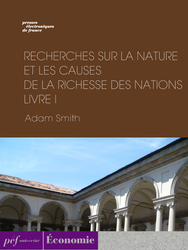In "An Inquiry into the Nature and Causes of the Wealth of Nations," Adam Smith deftly explores the foundations of economic theory, presenting a comprehensive analysis of the dynamics of production, labor, and trade. Employing a luminous prose style that intertwines philosophical introspection with empirical observation, Smith navigates the complexities of a burgeoning capitalist society in the 18th century. His seminal work critiques mercantilism while advocating for free markets and the 'invisible hand' that guides economic self-interest towards collective benefit, solidifying the book's status as a cornerstone of classical economics. Adam Smith, often revered as the father of modern economics, was not only a philosopher but also a keen observer of human behavior, shaped by the Enlightenment ideals of his time. With a background in moral philosophy and an acute awareness of the socio-political currents of his era, Smith crafted this treatise to challenge prevailing economic doctrines and to illustrate the potential of individual initiative in fostering societal wealth. Readers seeking to comprehend the intricacies of economic principles and their historical evolution will find Smith's work indispensable. "Wealth of Nations" is not merely an economic manuscript; it is a profound discourse on human society that continues to resonate with contemporary debates on capitalism and ethics in economics.

De la richesse des nations Livre I
Adam Smith
book
An Inquiry into the Nature and Causes of the Wealth of Nations : Adam Smith's Timeless Economic Classic
Adam Smith, Zenith Crescent Moon Press
book
Theorie der ethischen Gefühle : Ausgabe in neuer Übersetzung und Rechtschreibung
Adam Smith
book
Der Wohlstand der Nationen : Ausgabe in neuer Übersetzung und Rechtschreibung
Adam Smith
book
The Wealth of Nations
Adam Smith, The griffin classics
book
The Wealth of Nations
Adam Smith, Redhouse
book
The Wealth of Nations : The Definitive eBook Edition of Adam Smith's Timeless Classic on Economics
Adam Smith, MyBooks Classics
book
The Invisible Hand of the Market: The Theory of Moral Sentiments + The Wealth of Nations : 2 Pioneering Studies of Capitalism
Adam Smith
book
The Wealth of Nations & The Theory of Moral Sentiments
Adam Smith
book
Harvard Classics: All 71 Volumes
Johann Wolfgang von Goethe, Gotthold Ephraim Lessing, Bjørnstjerne Bjørnson, Thomas Carlyle, Theodor Storm, Plato, Theodor Fontane, René Descartes, Gottfried Keller, Mark Twain, Immanuel Kant, Charles Darwin, Martin Luther, Robert Louis Stevenson, William Shakespeare, Dante Alighieri, Euripides, Percy Bysshe Shelley, Charles Lamb, Henry David Thoreau, Henry James, Samuel Johnson, John Stuart Mill, Victor Hugo, David Hume, Joseph Addison, Jane Austen, John Locke, John Fletcher, Francis Beaumont, Leigh Hunt, Epictetus, Alphonse Daudet, Thomas De Quincey, Guy de Maupassant, George Eliot, Walter Scott, Laurence Sterne, Samuel Taylor Coleridge, Jonathan Swift, Christopher Marlowe, Wilhelm Grimm, William Hazlitt, Marcus Tullius Cicero, Daniel Defoe, Aesop, Richard Henry Dana, Henry Fielding, John Dryden, Philip Massinger, Pedro Calderón de la Barca, Bret Harte, George Sand, John Ruskin, Oliver Wendell Holmes, Ernest Renan, Robert Burns, David Garrick, Ralph Waldo Emerson, John Webster, Washington Irving, Izaak Walton, John Bunyan, Juan Valera, Alfred de Musset, James Russell Lowell, Charles Augustin Sainte-Beuve, Nathaniel Hawthorne, Homer, Edmund Burke, Plutarch, Molière, Aeschylus, Michael Faraday, Sophocles, William Makepeace Thackeray, Benjamin Franklin, Edward Everett Hale, Pierre Corneille, Jean Racine, Voltaire, Robert Browning, Oliver Goldsmith, Thomas Dekker, John Milton, Aristophanes, Blaise Pascal, Virgil, Richard Brinsley Sheridan, Simon Newcomb, William Penn, Walter Bigges, Philip Sidney, Herodotus, Walter Raleigh, Francis Bacon, Giuseppe Mazzini, Francis Pretty, George Berkeley, Thomas Hobbes, Adam Smith, Alessandro Manzoni, Abraham Cowley, Michel de Montaigne, Ben Jonson, John Woolman, Benvenuto Cellini, Sydney Smith, Jean Froissart, William Henry Harrison, William Harvey, Marcus Aurelius, Hans Christian Andersen, Thomas Malory, George Gordon Byron, Thomas à Kempis, Ivan Turgenev, Richard Steele, Thomas Browne, Archibald Geikie, Thomas Babington Macaulay, Leo Tolstoy, Fyodor Dostoevsky, Tacitus, William Roper, Hippocrates, Miguel de Cervantes, Thomas More, Friedrich von Schiller, Philip Nichols, Louis Pasteur, Joseph Lister, Jean Jacques Rousseau, Pliny the Younger, Charles W. Eliot, Edgar Alan Poe, Saint Augustine, Hermann Ludwig Ferdinand von Helmholtz, Francis Drake, Edward Haies, Niccolo Machiavelli, Ambroise Paré, William A. Neilson, Honoré Balzac, Alexander L. Kielland
book
Harvard Classics - Complete Collection of the Greatest Works of World Literature
Johann Wolfgang von Goethe, Gotthold Ephraim Lessing, Thomas Carlyle, Plato, Charles Darwin, Dante Alighieri, Euripides, Percy Bysshe Shelley, Charles Lamb, Samuel Johnson, John Stuart Mill, David Hume, Joseph Addison, Leigh Hunt, Epictetus, Thomas De Quincey, Samuel Taylor Coleridge, Jonathan Swift, Christopher Marlowe, Jacob Grimm, Wilhelm Grimm, William Hazlitt, Marcus Tullius Cicero, Daniel Defoe, Aesop, Richard Henry Dana, John Dryden, Pedro Calderón de la Barca, John Ruskin, Robert Burns, David Garrick, Ralph Waldo Emerson, Izaak Walton, John Bunyan, Homer, Edmund Burke, Plutarch, Molière, Aeschylus, Sophocles, William Makepeace Thackeray, Benjamin Franklin, Pierre Corneille, Jean Racine, Robert Browning, Oliver Goldsmith, John Milton, Aristophanes, Virgil, Richard Brinsley Sheridan, William Penn, Philip Sidney, Francis Bacon, Adam Smith, Alessandro Manzoni, Abraham Cowley, Ben Jonson, John Woolman, Sydney Smith, Marcus Aurelius, Hans Christian Andersen, George Gordon Byron, Thomas à Kempis, Richard Steele, Thomas Browne, Thomas Babington Macaulay, Miguel de Cervantes, Friedrich von Schiller, Pliny the Younger, Saint Augustine
book
Harvard Classics (All 51 Volumes)
Johann Wolfgang von Goethe, Gotthold Ephraim Lessing, Thomas Carlyle, Plato, René Descartes, Immanuel Kant, Charles Darwin, Martin Luther, Robert Louis Stevenson, William Shakespeare, Dante Alighieri, Euripides, Percy Bysshe Shelley, Charles Lamb, Henry David Thoreau, Samuel Johnson, John Stuart Mill, David Hume, Joseph Addison, John Locke, John Fletcher, Francis Beaumont, Leigh Hunt, Epictetus, Thomas De Quincey, Samuel Taylor Coleridge, Jonathan Swift, Christopher Marlowe, Jacob Grimm, Wilhelm Grimm, William Hazlitt, Marcus Tullius Cicero, Daniel Defoe, Aesop, Richard Henry Dana, John Dryden, Philip Massinger, Pedro Calderón de la Barca, John Ruskin, Oliver Wendell Holmes, Ernest Renan, Robert Burns, David Garrick, Ralph Waldo Emerson, John Webster, Izaak Walton, John Bunyan, James Russell Lowell, Charles Augustin Sainte-Beuve, Homer, Edmund Burke, Plutarch, Molière, Aeschylus, Michael Faraday, Sophocles, William Makepeace Thackeray, Benjamin Franklin, Pierre Corneille, Jean Racine, Voltaire, Robert Browning, Oliver Goldsmith, Thomas Dekker, John Milton, Aristophanes, Blaise Pascal, Virgil, Simon Newcomb, William Penn, Walter Bigges, Philip Sidney, Herodotus, Walter Raleigh, Francis Bacon, Giuseppe Mazzini, Francis Pretty, George Berkeley, Thomas Hobbes, Adam Smith, Alessandro Manzoni, Abraham Cowley, Michel de Montaigne, Ben Jonson, John Woolman, Benvenuto Cellini, Sydney Smith, Jean Froissart, William Henry Harrison, William Harvey, Marcus Aurelius, Hans Christian Andersen, Thomas Malory, George Gordon Byron, Thomas à Kempis, Richard Steele, Thomas Browne, Archibald Geikie, Thomas Babington Macaulay, Tacitus, William Roper, Hippocrates, Miguel de Cervantes, Thomas More, Friedrich von Schiller, Philip Nichols, Louis Pasteur, Joseph Lister, Jean Jacques Rousseau, Pliny the Younger, Edgar Alan Poe, Saint Augustine, Brinsley Sheridan, Hermann Ludwig Ferdinand von Helmholtz, Francis Drake, Edward Haies, Niccolo Machiavelli, Ambroise Paré, William A. Neilson
book
